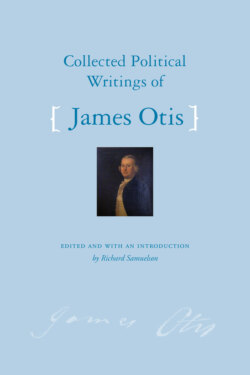Читать книгу Collected Political Writings of James Otis - Otis James - Страница 12
На сайте Литреса книга снята с продажи.
Оглавление[print edition page 1]
PART 1
Otis in the Writs of Assistance Case
[print edition page 2]
[print edition page 3]
THE Writs of Assistance case was argued twice, in February and again in November of 1761. According to M. H. Smith, the leading scholar of the case, Chief Justice Hutchinson wrote home to England after the February hearing to learn more about the kinds of writs in use in England and how they were issued. Having heard from England, Hutchinson convened a second hearing, after which the court ruled that the writs were legal in Massachusetts and that the court was the proper authority to issue them.
Three lawyers argued the case. Jeremiah Gridley, the leader of the Massachusetts Bar, argued for the Crown. James Otis Jr. argued against the writs. The evidence suggests that the third lawyer, Oxenbridge Thatcher, was amicus curiae, a friend of the court, charged with enlightening them dispassionately about the underlying legal issues. Robert Auchmuty, Jr. also makes a brief appearance in the case. M. H. Smith suggests that “he probably appeared in the capacity of acting Advocate General.”
A writ of assistance was a general search warrant given by the court to customs agents to search for contraband. It empowered customs agents and their deputies to access all “ships, boats, vessells, vaults, cellers, warehouses, shops, or other places” where imported goods were or might be hidden to search for contraband.
The case is significant because in it Otis raised two key issues. He said that “this writ is against the fundamental principles of law” and “as to Acts of Parliament, an Act against the Constitution is void: an Act against natural Equity is void: and if an Act of Parliament should be made, in the very words of this Petition, it would be void.” John Adams made the case famous by highlighting Otis’s argument and recurring back to it as a touchstone throughout his long and eventful life. On July 3, 1776, the day after Congress voted that “These Colonies are and of right ought to be free and independent states,” Adams wrote home to Abigail, “When I look back to the year 1776, and recollect the argument concerning Writs of Assistance, in the Superior Court, which I have hitherto considered as the commencement of the controversy, between Great Britain and America, and run through the whole period from that time to this, and recollect the
[print edition page 4]
series of political events, the chain of causes and effects, I am surprised by the suddenness, as well as greatness of this revolution.”1
We have records of the case because young John Adams took notes of the February 1761 hearing, and Josiah Quincy Jr., another young lawyer in Boston, took notes of the August 1761 rehearing in November. Unfortunately, Quincy appears to have missed most of Otis’s argument. Quincy’s grandson compiled the notes of the case, which are reproduced here. In his edition Quincy includes a writ of assistance assigned to Charles Paxton in 1752 as an appendix, included here as “A Sample Writ of Assistance.” These documents are taken from the edition of Quincy’s Reports to be found in the University of Michigan’s “Making of America” digital archive. These are followed by John Adams’s effort to re-create Otis’s argument in full as it appeared in The Works of John Adams (1856). Adams first published this version of Otis’s speech in the Massachusetts Spy in 1773. The article on writs of assistance that follows was probably by Otis and originally appeared in the Boston Gazette on January 4, 1762.
